
ITV is a British free-to-air public broadcast television network. It was launched in 1955 as Independent Television to provide competition and reduce the current monopoly to the then BBC Television. ITV is the oldest commercial network in the UK. Since the passing of the Broadcasting Act 1990, it has been legally known as Channel 3 to distinguish it from the other analogue channels at the time: BBC One, BBC Two, and Channel 4.
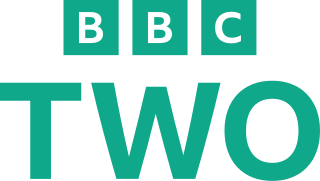
BBC Two is a British free-to-air public broadcast television channel owned and operated by the BBC. It covers a wide range of subject matter, with a remit "to broadcast programmes of depth and substance" in contrast to the more mainstream and popular BBC One.
Regular television broadcasts in the United Kingdom started in 1936 as a public service which was free of advertising, which followed the first demonstration of a transmitted moving image in 1926. Currently, the United Kingdom has a collection of free-to-air, free-to-view and subscription services over a variety of distribution media, through which there are over 480 channels for consumers as well as on-demand content. There are six main channel owners who are responsible for most material viewed.
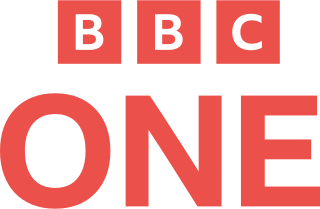
BBC One is a British free-to-air public broadcast television channel owned and operated by the BBC. It is the corporation's oldest and flagship channel, and is known for broadcasting mainstream programming, which includes BBC News television bulletins, primetime drama and entertainment, and live BBC Sport events.
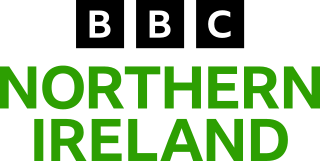
BBC Northern Ireland is a division of the BBC and the main public broadcaster in Northern Ireland. It is widely available across both Northern Ireland and the Republic of Ireland.
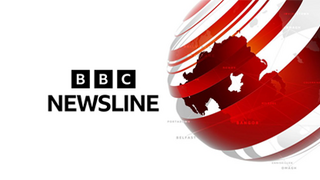
BBC Newsline is the BBC's national television news programme for Northern Ireland, broadcast on BBC One Northern Ireland from the headquarters of BBC Northern Ireland in Ormeau Avenue, Belfast.
Springwatch, Autumnwatch and Winterwatch, sometimes known collectively as The Watches, are annual BBC television series which chart the fortunes of British wildlife during the changing of the seasons in the United Kingdom. The programmes are broadcast live from locations around the country in a primetime evening slot on BBC Two. They require a crew of 100 and over 50 cameras, making them the BBC's largest British outside broadcast events. Many of the cameras are hidden and operated remotely to record natural behaviour, for example, of birds in their nests and badgers outside their sett.

Daily Politics is a BBC Television programme which aired between 6 January 2003 and 24 July 2018, presented by Andrew Neil and Jo Coburn. Daily Politics took an in-depth review of the daily events in both Westminster and other areas across Britain and abroad, and included interviews with leading politicians and political commentators.

The Graham Norton Show is a British comedy chat show presented by Graham Norton. It was initially broadcast on BBC Two, from 22 February 2007, before moving to BBC One in October 2009. It currently airs on Friday evenings, with Norton succeeding Friday Night with Jonathan Ross in BBC One's prestigious late-Friday-evening slot in 2010.
Analogue terrestrial television in the United Kingdom was originally the method by which the significant majority of viewers in the UK, the Channel Islands and the Isle of Man received television. Analogue terrestrial television broadcasts have fully ceased in the UK with Northern Ireland being the last region to have ceased transmission analogue terrestrial television broadcasts. Northern Ireland switched off the last analogue television signals, making all of the United Kingdom only capable of receiving digital television, in the early hours of 24 October, 2012. It has been completely replaced by digital terrestrial television and other non-terrestrial means as of the end of 2012.

The Bill is a British police procedural television series, first broadcast on ITV from 16 August 1983 until 31 August 2010. The programme originated from a one-off drama, Woodentop, broadcast in August 1983.
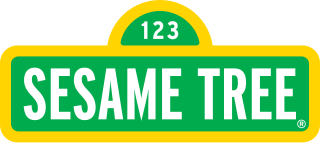
Sesame Tree was an adaptation of the American children's television series, Sesame Street, which was made entirely in Northern Ireland. The series was produced by Belfast based production company, Sixteen South and Sesame Workshop. The first episode aired on BBC Two in Northern Ireland on 5 April 2008, with the first series subsequently airing nationwide on CBeebies in August 2008.
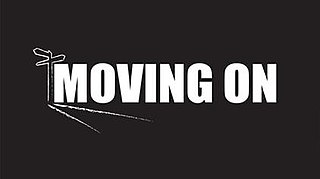
Moving On is a British anthology television series, created and executive produced by Jimmy McGovern, which consists of a series of standalone contemporary dramas, each focusing on a pivotal turning point in the life of one or more of the characters in the featured episode. The first episode aired on BBC One on 18 May 2009, and since, a total of 65 episodes have been broadcast. As of 2023, there has been no confirmation of a thirteenth series and the show has presumably ended.

Crimewatch is a British television programme produced by the BBC, that reconstructs major unsolved crimes in order to gain information from the public which may assist in solving the case. The programme was originally broadcast once a month on BBC One, although in the final years before cancellation it was usually broadcast roughly once every two months.
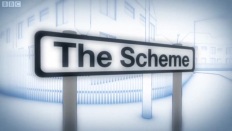
The Scheme is a BBC Scotland BAFTA-award-winning documentary series which follows the lives of six families in the Onthank and Knockinlaw housing schemes in Kilmarnock. The series has been the subject of some media criticism, with the series being labelled as "poverty porn" and described as giving a "misleading impression" of life on the estate.
Gears and Tears is a British television documentary series about stock car racing, which originally aired on BBC One in 2010.

Real Crime is a British documentary television series produced by ITV Studios for the ITV network. Each episode examines a notorious crime and includes interviews with relatives of the victims. It was broadcast from 2001 to 2011, and ended after ten series. From 2008 until 2011, each episode was presented by Mark Austin and from 2010 was listed as Real Crime with Mark Austin.
Soft Border Patrol is a Northern Irish mockumentary sitcom in the style of a reality television programme based around the subject of the Republic of Ireland–United Kingdom border in a post-Brexit world. It shadows the Soft Border Patrol, a fictional border agency backed by governments in London, Dublin and Belfast, and the European Commission in Brussels. The title is a play on the desire at the time of writing for the outcome of the Brexit negotiations for there to be a soft border between the Republic of Ireland and Northern Ireland. Much of the series was unscripted, with broad ideas given to the cast by the writers.
This is a timeline of television in Northern Ireland.












